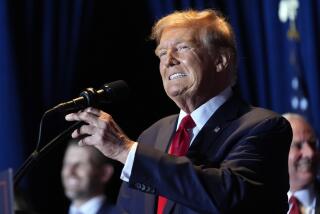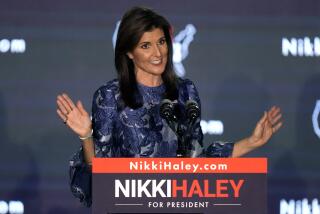No support surge for McCain
- Share via
ANDERSON, S.C. — Finally, nearly five years into the Iraq war, John McCain sees vindication at hand.
More than any other candidate for president, McCain has tied his fortunes to support for sending more U.S. troops into the unpopular war. Now that violence in Iraq has waned after a troop buildup, McCain wants some credit.
And so the Republican senator from Arizona, once a prisoner of war in Vietnam, came this week to South Carolina, an early-voting state that is home to many veterans, and proclaimed he was right all along.
“I knew what needed to be done, and now we’re doing it,” he told uniformed veterans and others packed into Hudson’s Smokehouse in Lexington for a barbecue dinner.
Just back from a Thanksgiving weekend visit to Iraq, McCain told stories of restaurants newly opened, soccer games, a decline in bombings, fewer bodies found dumped overnight, and “a dramatic shift in the attitude of the Iraqi people.”
“We are winning in Iraq, and that’s a fact,” he said.
Yet it is far from clear that GOP voters are ready to reward McCain. He might have been right about the need for a troop buildup, said Karin Hollack, a Republican college student from Des Moines. But, she said, that does not make him any less “off-putting.”
“I don’t really like him,” said Hollack, 27.
McCain is the only major Republican candidate to make the Iraq war his campaign centerpiece. Rudolph W. Giuliani, Mitt Romney and Mike Huckabee typically mention it only in passing or in response to questions.
McCain, however, spoke of little else as he campaigned Monday and Tuesday in Lexington, Seneca and Anderson.
“I’m grateful that we Republicans have stood fast,” he told the crowd at Hudson’s Smokehouse. “I’m grateful that this president has stood fast.”
In his newest television ad, McCain looks into the camera and boasts of condemning former Defense Secretary Donald H. Rumsfeld for deploying what the senator long saw as too few troops in Iraq.
“I made the Pentagon angry when I criticized Rumsfeld’s Iraq strategy, and I upset the media when I supported the strategy that’s now succeeding,” McCain says in the ad, which plays up his rebel persona.
He picked up the same theme in Lexington. “No one else who will appear before you who’s running for president said a word,” McCain told the crowd.
Senior McCain advisor Charles Black said the decline in violence showed that McCain had exercised sound judgment by calling for the sort of troop buildup that President Bush ordered early this year.
“The other guys don’t talk about Iraq that much, because they don’t have the credentials or experience that he has,” Black said.
Iraq’s civilian death toll has dropped sharply in recent months. The Pentagon credits the decision to send about 30,000 more U.S. troops to Iraq this year; say violence has ebbed in part because militants have largely succeeded in cleansing their neighborhoods of rival religious sects.
Campaigning in South Carolina, McCain acknowledged that Iraq’s political world remained in disarray, with scant progress toward provincial elections or a pact for sharing oil revenue. But, he told a crowd Tuesday in Anderson, “you can’t have any of it until you have an environment of security.”
A national survey released Tuesday found a shift in Americans’ opinion on Iraq, with 48% saying the war was going well, up from 30% in February. The poll, by the Pew Research Center for the People & the Press, found 74% of Republicans said the U.S. military effort was going well, up from 51% in February.
At the same time, 46% of adults believed the U.S. effort in Iraq would fail -- unchanged from February. And 54% said the United States should bring home its troops “as soon as possible” -- also virtually unchanged.
“The public is responding to the better news out of Iraq,” said Andrew Kohut, the Pew center’s director. “There is a little more positive view about the way things are going, but the public is not rushing to a new judgment about what the policy decision should be.”
The political consequences of the change in public outlook, he said, were limited at best for McCain, Bush and other supporters of U.S. policy in Iraq.
It is also unclear whether reduced violence in Iraq would benefit McCain more than it would other Republican candidates. “All of the major Republican candidates have been pretty supportive of the surge policy and the war effort, so it doesn’t really distinguish him,” said Alan Abramowitz, a political scientist at Emory University in Atlanta.
Once widely viewed as front-runner for the Republican nomination, McCain has dropped in the polls this year. With his campaign nearly broke, it has shed scores of workers.
So far, McCain has focused his efforts mainly on New Hampshire, where he won the 2000 presidential primary. Should he win there Jan. 8, he is counting on the victory to translate into a strong finish 11 days later in the South Carolina GOP contest.
But McCain has long-standing problems in positioning himself in the crowded GOP field. His call for providing a path to citizenship for some illegal immigrants now living in this country has angered many Republicans, and his support for the war has turned off many of those who backed him eight years ago.
“The hard-core conservatives never trusted him, and he hasn’t been successful in winning them over, and now the moderates and independents who supported him in 2000 don’t trust him either,” Abramowitz said.
Doug Wigert, 45, a Republican from Boone, Iowa, said any credit he would give McCain for supporting the troop buildup was vastly outweighed by his stand on immigration and the campaign-finance law that bears his name.
“I don’t think he’s a true Republican,” Wigert said.
Still, some Republican veterans who came to hear McCain this week in South Carolina were quick to praise him for insisting on more troops, and they vowed to support him.
“You have to give it time,” Lexington insurance agent Dennis N. Jones said of the U.S. effort in Iraq. “It wasn’t going to happen overnight.”
stuart.silverstein@latimes.com
Finnegan reported from Anderson, Silverstein from Los Angeles. Times staff writer Seema Mehta in West Des Moines, Iowa, contributed to this report.
More to Read
Get the L.A. Times Politics newsletter
Deeply reported insights into legislation, politics and policy from Sacramento, Washington and beyond. In your inbox twice per week.
You may occasionally receive promotional content from the Los Angeles Times.










